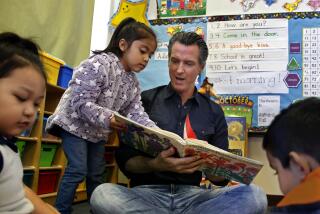Letters: Better education starts at home
Re “How to grade public schools,” Opinion, Nov. 14
Jack Schneider discusses the inherent problems with the interpretation of test results.
During my career in higher education, I did a survey analyzing a plethora of studies that attempted to determine correlations between a number of factors, such as teacher experience, class size and numerous other variables.
What these scholarly studies revealed was that there was a statistically significant correlation only between family income and test scores: Put simply, higher-income kids scored much better than their poorer counterparts.
Probably the best way to correct low-scoring schools is to finally do something about the frighteningly high number of poor families in the United States.
Bruce Mitchell
Oxnard
The writer is a professor emeritus of education at Eastern Washington University.
Schneider correctly explains why standardized test scores are imperfect indicators of school and teacher effectiveness, and he praises Education Secretary Arne Duncan for granting some school districts the freedom to measure school success in ways that are not so strictly tied to test scores.
What Schneider fails to mention is that, to receive the waiver, these districts had to agree to use standardized test scores in teacher evaluations under the guise of “education reform.”
If there is a more perfect example of a Catch-22, I am unaware of it.
Kurt Page
Laguna Niguel
ALSO:
Letters: California needs desalination
Letters: Cruising for a customer revolt
Letters: About those canceled insurance plans
More to Read
Start your day right
Sign up for Essential California for news, features and recommendations from the L.A. Times and beyond in your inbox six days a week.
You may occasionally receive promotional content from the Los Angeles Times.






